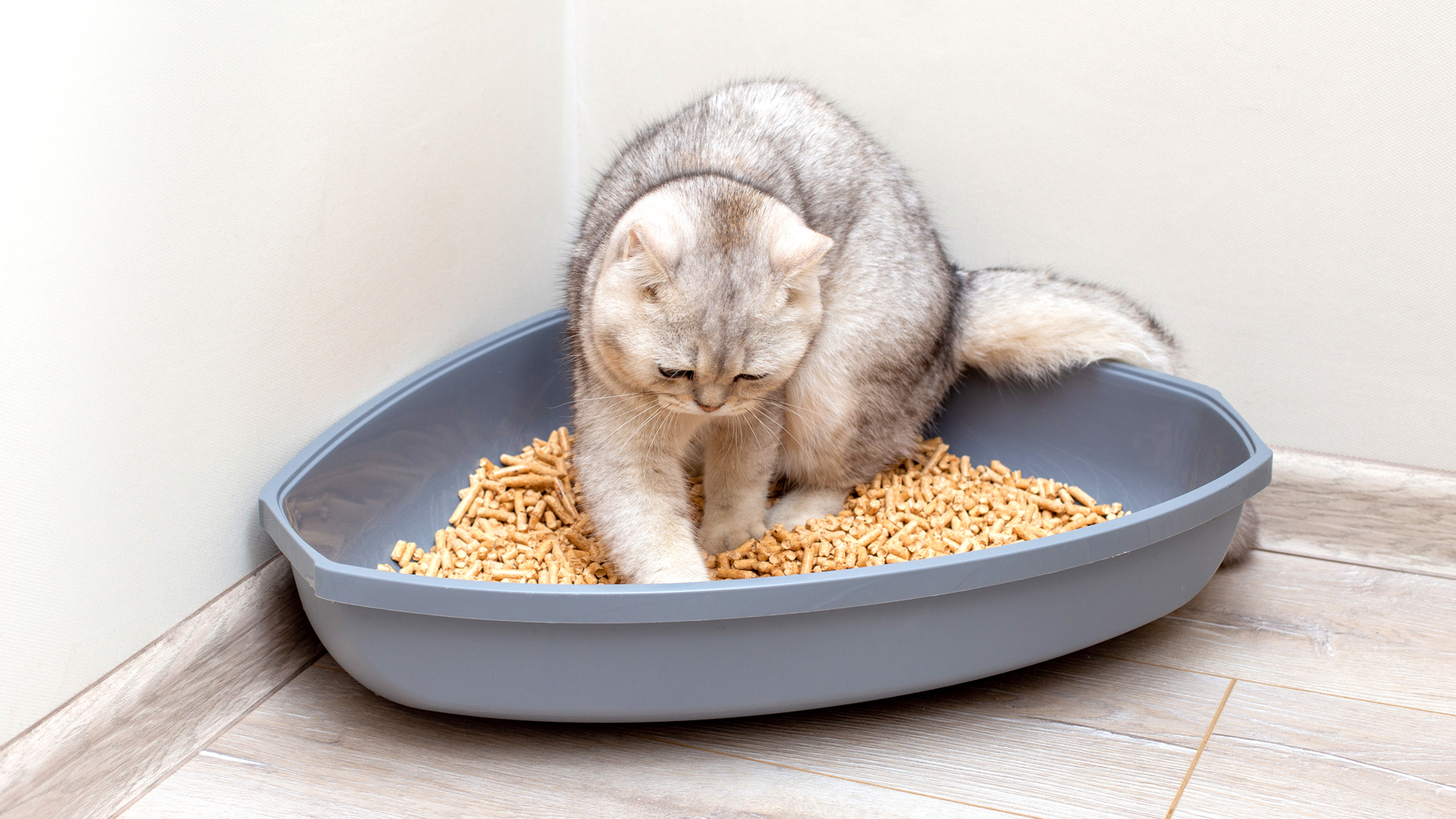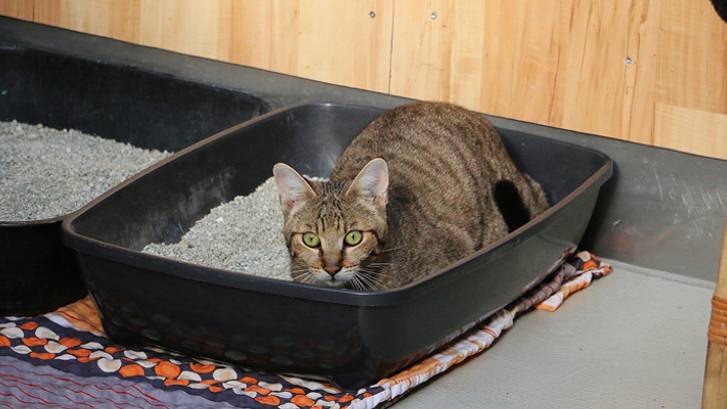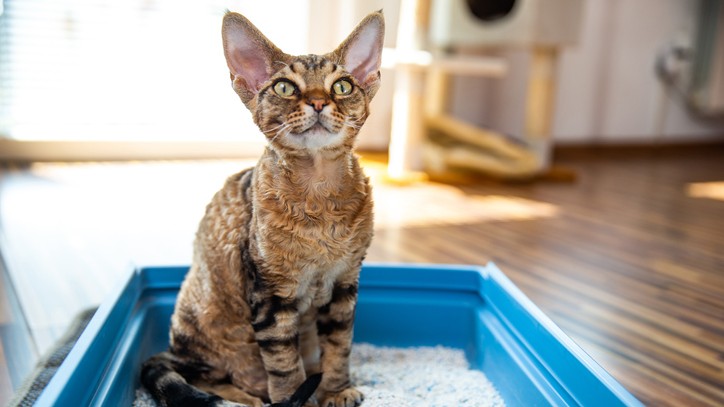Why is my cat sleeping in their litter box?
Why is my cat sleeping in their litter box? Veterinary surgeon, Rebecca MacMillan explores the reasons behind this behavior and shares preventative tips

Get the best advice, tips and top tech for your beloved Pets
You are now subscribed
Your newsletter sign-up was successful
Why is my cat sleeping in their litter box? It's a question that crosses the minds of many feline owners, causing both confusion and concern. But fear not, as we've enlisted the expertise of Rebecca MacMillan, a qualified veterinary surgeon, to shed light on this peculiar behavior.
The majority of moggies are spoilt with the very best kitten food, plenty of toys, and a comfy bed. So if you find your cat snoozing in their litter box instead of their top of the range bed, it can be baffling. For some cats, sleeping in their litter box may be a matter of comfort and familiarity. The litter box provides a cozy and enclosed space, reminiscent of the secure feeling they had as kittens in a nest or den. It may serve as a private sanctuary where they feel protected and undisturbed.
However, it's not surprising if you have questioned is my cat sick? Or if you’re concerned about your cat’s emotional well-being, sometimes stranger behaviors are signs of anxiety in cats. Cats are instinctively clean animals, and if they choose to sleep in their litter box, it may indicate a problem with their physical or emotional well-being.
Thankfully, MacMillan is here to bring any worried cat owners her extensive veterinary experience and professional insight as she unveils whether it's a normal behavior, explores any underlying issues that might contribute to it, and suggests ways to prevent your cat from trying to sleep in its litter box.
Is it normal for cats to sleep in their litter box?
Cats are usually very clean animals and are good at separating their toileting and rest areas. So it is considered odd if your cat starts to sleep in his litter box. Most normal cats will pick a clean and comfortable area for a snooze, so it’s important to identify if there is an underlying problem going on causing them to act strangely.

Why is my cat laying in his or her litter box?
There are several reasons why your cat might lay or even sleep in his litter box. Some of the common reasons for a cat doing this odd behavior include:
Early behavior in kittens
Kitten sleeping in litter box? Then they could still be learning! Many kittens do slightly odd behaviors whilst exploring and developing. They may not understand how to differentiate between their toileting area and their bed yet, especially whilst house-training.
Get the best advice, tips and top tech for your beloved Pets
It's also not uncommon for kittens to just crash and fall asleep, especially after a period of zooming around – so this could accidentally happen in the litter box!
Health issues in elderly cats
Elderly cats, like kittens, also become tired very easily and may choose to just lay down for a little rest. Older cats can also struggle with conditions such as osteoarthritis meaning they might struggle to get in and out of a deep-sided litter box comfortably, meaning they stay put for rest.
Cognitive dysfunction is also seen in elderly cats. Dementia-like issues could mean your cat becomes confused and may start to act oddly. Sleeping in his litter tray could be an example of this.
Toileting problems and illness
If your cat has problems going to the bathroom then he may decide to just camp out in his litter box. If they are struggling with constipation or diarrhea or feel the urge to urinate constantly because they have an underlying urinary issue, then they may end up spending a lot more time in there.
If they feel unwell, then it could also feel like too much effort to leave the box, and just stay there for a nap instead. Cats that are dying or recovering from surgery are more likely to struggle to get out of the box.
Anxiety issues
If your cat is feeling anxious then they might seek comfort by hiding in their litter box. Anxiety in cats is commonly seen in cats that have had a recent house move. The litter box might be the only familiar space in their new environment meaning they are drawn to it for comfort and security. Most cats will soon come out of their shell and start exploring the rest of their environment.
Pregnancy
If your cat is pregnant they may show some odd behaviors, especially as they approach their due date. She may need to toilet frequently and might not have the energy to keep going in and out of the litter box. Some cats will start to look for a nest to have their kittens in and might be eyeing up the litter box for this purpose, especially if it is in a quiet and undisturbed area of the house.
Guarding behaviors
Cats can be quite territorial animals. This can lead them to guard resources like food, water bowls, beds, and even litter boxes. This is more commonly seen in households with multiple cats, particularly if there aren’t enough resources to go around (many cats don’t like sharing!).
Similarly, if one of the other cats in your house is bullying your cat, this could mean they seek refuge in the litter box, especially if the other cats aren’t willing to share a bed or a sofa with them.
Safety
For some cats, their litter tray can feel like a safe space. Most boxes have raised sides, and some are even enclosed with a roof which can help make your cat feel secure if there is something scary going on. Fireworks, loud music, or lots of visitors could lead your cat to seek refuge in their litter box.
How to stop a cat from sleeping in his or her litter box
Stopping your cat from sleeping in his litter box will usually require identifying the underlying cause of your cat's behavior. However, there are some things you can try even if you aren’t sure why your cat is behaving like this:
- Get your cat checked by a veterinarian, especially if they are showing other signs of ill health like diarrhea, difficulty urinating, or stiff joints
- Try calming pheromone plug-in diffusers if your cat is feeling stressed
- Provide multiple litter trays and bed options if your cat is guarding resources against other cats in the house
- Give your cat other places that they can hide like cardboard boxes or cozy beds
- Try lower sided litter boxes for elderly cats so they can get in out and more easily, and make sure their bed is in an easy-to-reach spot

Can a dirty litter box make a cat sick?
Sleeping in a litter box is unlikely to make your cat sick but could be a sign that they are already poorly or not quite themselves. It is not particularly hygienic though, especially if they alternate this with sleeping on your bed or your sofa, so you might want to take some steps to discourage your cat from sleeping in his tray.
Sleeping in the litter box is not considered normal cat behavior, and could be a sign that something is going on. If there is no easily identifiable trigger you may want to take your cat to your veterinarian to get them checked out to be on the safe side.
Rebecca is a veterinary surgeon who graduated from the Royal Veterinary College in London in 2009. She enjoys medicine in particular and she is proud to have achieved a BSAVA postgraduate certificate in small animal medicine (with commendation) from Nottingham Trent University in 2021.
She has a wealth of experience in first opinion small animal practice, having done a mixture of day-to-day routine work, on-call emergency duties and managerial roles since 2009.
She writes on various feline and canine topics for the Veterinary Content Company and a freelance basis, including behavior, nutrition, and health. Outside of work and writing she enjoys walking her own dog, spending time with her young family and baking!
- Jessica DowneyFreelance Writer

